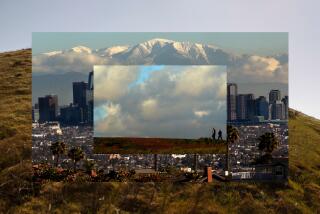A vegan coach who chewed up the trail
A vegan diet: Thatâs what Santa Monica College track coach Joshua Garrett credits for helping him traverse the famed Pacific Crest Trail and possibly setting a record doing it.
The rugged 2,650-mile trail runs from the border of Mexico to Canada, crossing some of the most scenic wilderness in the world. Itâs a once-in-a-lifetime accomplishment for hikers, many of whom cover the distance in chunks over the course of several years. And then there are endurance athletes such as Garrett, 30, of Pacific Palisades, who tackled it all at once.
Garrett credits his vegan diet for helping him quickly recover as he averaged nearly 45 miles a day, beginning June 10 and ending Aug. 8, setting what is believed to be a new trail record of 59 days, 8 hours and 14 minutes. While the Pacific Crest Trail Assn. does not verify such records, trail information specialist Jack Haskel said: âI have no reason to doubt Josh when he says he did what he did. ... Itâs a really incredible achievement, hiking that fast.â
The hike also served as a fundraiser for Garrett, who works with Mercy for Animals, an animal rights group, and hopes to ultimately raise $26,500 ($10 for each mile of the trail) for undercover video investigations into animal cruelty. We asked Garrett about his endurance adventure and his diet.
--
Letâs start with the questions you must get asked the most: How do you get your protein? And what did you eat while hiking the trail?
I get my protein the same way a gorilla does, or a wild mustang or an elephant. A plants-based diet gives us everything we need for strength and endurance. We donât need to eat meat in order to be strong and healthy. During the hike I ate a lot of Pro Bar vegan energy bars. [Pro Bar was a sponsor.] I also ate a lot of peanut butter packets and vegan jerky ... which is high in protein. ... I found I recovered quickly from each dayâs beating. I burned about 8,000 calories a day, and I lost about 15 pounds. But I felt strong as I went along.
--
We live in a world where being âconnectedâ is addictive. Yet you spent nearly two months in near-complete isolation. What was that like?
Being solo is tough. Everything you can imagine pops into your head. You really do go through high and low points. ... As miserable as it was at times, I thought, âWhat Iâm going through is nothing compared to what animals are going through on factory farms or slaughterhouses.â ... But most of the time was silent walking and just listening to the wildlife and being absorbed in my surroundings. It was amazing.
--
You were raised on a traditional diet. Why did you embrace veganism?
My girlfriend rescues turkeys. I just realized that they are so smart and have such great personalities. I thought, âHow can I eat them anymore?â ... My consciousness shifted. I also watched Mercy for Animals videos and the documentary âForks Over Knivesâ [a provocative 2011 film that links a diet heavy in animal products and processed foods to a variety of illnesses].
--
Many people cannot imagine giving up bacon. Is there any room for compromise? What about humanely raised meat?
Even humanely raised animals still suffer. For those who say they are not going to change, that quitting meat cold turkey is not an option, I understand that. Maybe [they could] not center every meal around meat, maybe go meat-free once a day. I would ask them to consider other options for protein. ... Seitan and tofu. Hemp proteins. Pea proteins. Rice and beans.
--
Man cannot live by pea proteins alone. What are your favorite vegan meals, and what are your favorite restaurants in and around Los Angeles?
I love sprouted grain bagels with peanut butter, veggie burgers and burritos with black beans and rice ... and tofu stir fries. When I go out to eat, I love Thai food and Indian food. I go to Veggie Grill, Native Foods Cafe, Cafe Gratitude, and Thai Vegan on Main Street in Santa Monica. Iâm a big food guy, and there is so much good stuff to eat.
--



